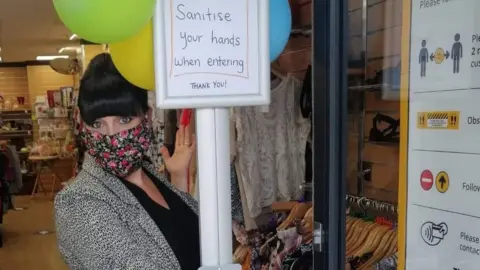Charity shops tell donors: 'Think before giving'
 BBC
BBCPeople should call and check before they drop off donations at charity shops, a trade association has warned.
There are fears the pent-up demand to donate after lockdown could lead to overcrowding in shops, the Charity Retail Association said.
Chief executive Robin Osterley said "we have two asks of the generous public".
"Be thoughtful - is this stuff you'd be prepared to buy yourself? And the second is to contact the shop before you roll up with armfuls of goods."
The Salvation Army made record sales on Monday, after non-essential shops reopened in England and Wales.
Meanwhile Oxfam reported a 77% increase in sales compared with 2019, and Cancer Research UK took half a million pounds - more than double what it was expecting.
But the same big names are encouraging would-be donors to phone and book a slot to drop.
 Charity Retail Association
Charity Retail AssociationManaging donations has been a Covid learning curve for the sector, as lockdowns have prompted mass clear-outs of unwanted goods.
However, charity shops are better prepared this time, Mr Osterley said. Take for example Stockport hospice charity, Beechwood Cancer Care. There's been a queue of customers at its Heald Green precinct. But it is only open to shoppers, not droppers, this week.
Its manager, Sara Tilston, said it had been really busy: "Yesterday was brilliant, we loved it.
"People have really struggled for money this year and being able to get extra supplies a lot cheaper is important."
She was turning away donations this week, but said that from next week she would accept donations on Tuesdays and Fridays, from the back door. "We want to use up to the donations that we've collected through lockdown."
There's extra pressure on these volunteer-run services to be safe and compliant.
In all the fanfare of the 12 April reopening in England, the return of the humble charity shop was anticipated for a variety of reasons.
The stores offer valuable employment and volunteering experience to thousands of people, many of whom are likely to be vulnerable or isolated otherwise.
Second-hand fashion has gained a big following among the environmentally conscious - as well as bargain hunters.
Moreover, for many making a purchase, this is a need not a desire. The pandemic has nudged 3.5 million more people into financial dire straits.

But lockdown has also given many of us yet another chance to have a good old clear out.
Take Susanne Burwell, in Hull, who has a haul of good quality items that stretches across her dining table and all over her sofa.
"I've got a suitcase full of clothes and all my shoes ready to go," she told the BBC. She also has a range of sporting items to pass on - a wetsuit, a bike and badminton rackets.
"It's become a weight on my mind. I just want to have the space again, but I am quite excited that things might get another life."
'We don't have room'
However, she said she wouldn't be taking them to the charity shop this time.
"I remember last time it was 'please don't bring us any more stuff, we don't have room for it'. I've heard charity shops are quite full again, so I'm booking a car boot."
Although it has got more difficult to donate, with set days and queues to hand on unwanted items, Robin Osterley said most people were still willing to wait to give their things away, rather than sell them.
He said there had been a steady stream of donations this week already. He simply wishes his members could have stayed open throughout lockdown, like supermarkets.
"People have been sitting on piles of clothes for a long time, and we are grateful they have been doing that.
"For us it's been more frustrating to be classed as non-essential retail. We feel we are very much essential."
His organisation is keen to stress the contribution charity shops make to UK life, listing their presence on struggling high streets, the volunteering skills people can earn, as well as the cash boost to hundreds of good causes.
Last year, a government committee warned that the funding gap left by closing charity shops would create irreparable damage to the sector.
Its survival will rely on the support of shoppers and droppers alike.
Ms Tilson, in Stockport, said charity shops weren't just about donations and bargains: "We also help those who want to come out for a chat, just to see us.
"It was so good to see regular customers when we opened. Who needs Primark anyway?"
